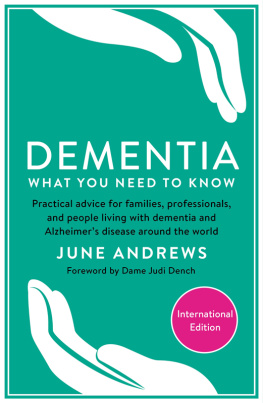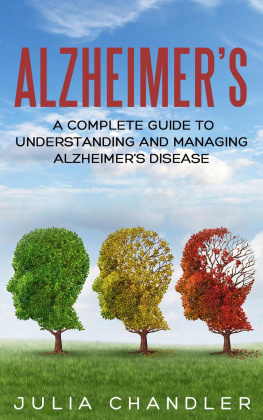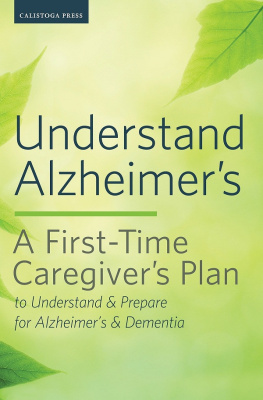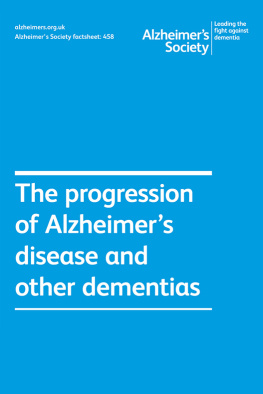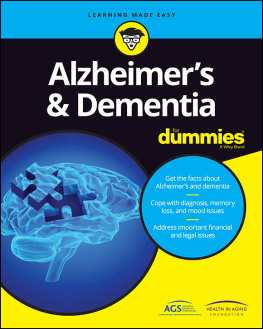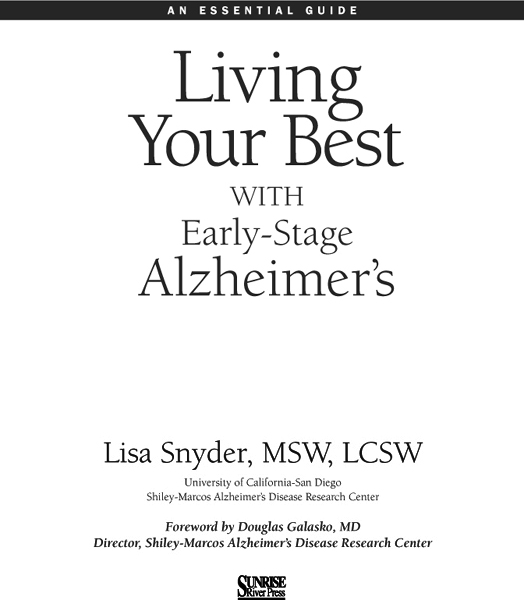Praise for Living Your Best with
Early-Stage Alzheimers
There are dozens of books about Alzheimers, but this one truly lives up to its name as an essential guide for those living with the disease. It also provides families and friends with useful information and insights to help loved ones. This most readable book is simply a gem.
Daniel Kuhn, MSW, LCSW
Director, Professional Training Institute, Alzheimers Association-Greater Illinois Chapter and author of Alzheimers Early Stages: First Steps for Family, Friends and Caregivers
Finallyan extremely informative and comprehensive book written specifically for people who are living with early dementia! Lisa Snyder has realistically captured the complexities of the early-stage experience with all its challenges, frustrations, and light-hearted moments in this sensitively written work. This book should be required reading for everyone who is living with early-stage Alzheimers, their family members, caregivers and professionals alike. Its an invaluable resource that I could not recommend more highly!
Paulette Michaud, MSW, LCSW
Director of Early Stage Services
Alzheimers Association, New York City Chapter
A wonderful, rich, informative and hopeful resource for anyone beginning a journey into Alzheimers or related dementia. Lisa Snyder strips away fear and negativity to roll out this road map on how to have the best life and make every day count. Highly recommended for persons diagnosed with early dementia and their friends and families.
David Troxel, MPH
co-author, The Best Friends Approach to Alzheimers Care
Living Your Best is the best medicine for individuals with early-stage Alzheimers and their families! Always encouraging without over-promising, this is a uniquely reassuring, comprehensive, and essential guide that you will read and re-read again.
Lisa P. Gwyther, MSW, LCSW
Co-Author, The Alzheimers Action Plan: A Family Guide
Education Director, Bryan Alzheimers Disease Research Center, Duke University School of Medicine

Sunrise River Press
39966 Grand Avenue
North Branch, MN 55056
Phone: 651-277-1400 or 800-895-4585
Fax: 651-277-1203
www.sunriseriverpress.com
2010 by Lisa Snyder
All rights reserved. No part of this publication may be reproduced or utilized in any form or by any means, electronic or mechanical, including photocopying, recording, or by any information storage and retrieval system, without prior permission from the Author. All text, photographs, and artwork are the property of the Author unless otherwise noted or credited.
All reasonable effort has been made to ensure the accuracy of the information in this book. However, due to ongoing research and discoveries, the information in this book may not reflect the latest standards, developments, or treatments. This book is intended for educational purposes, and is not intended to be all inclusive or to be a substitute for direct diagnosis and treatment by a qualified physician. Readers who have questions about a particular condition or possible treatments for that condition are advised to consult with a physician. The Author and the Publisher shall not be liable for any damages allegedly arising from the information in this book. The opinions expressed in this book are the Authors alone and not those of the Publisher. Whenever a person can be identified in this book, either that person or a surviving family member has given the Author permission to include that persons story or quote in this book, or the story or quote is reproduced from a previously published source.
All trademarks, trade names, model names and numbers, and other product designations referred to herein are the property of their respective owners and are used solely for identification purposes. This work is a publication of Sunrise River Press, and has not been licensed, approved, sponsored, or endorsed by any other person or entity.
Edit by Karin Craig
Layout by Monica Seiberlich
ISBN 978-1-934716-03-8
Item No. SRP603
Library of Congress Cataloging-in-Publication Data
Snyder, Lisa.
Living your best with early-stage Alzheimers : an essential guide / by Lisa Snyder.
p. cm.
Includes bibliographical references and index.
ISBN 978-1-934716-03-8
1. Alzheimers diseasePopular works. I. Title.
RC523.2.S6449 2010
616.831dc22
2009047788
Printed in USA
10 9 8 7 6 5 4 3 2 1
Contents
Foreword
L ifespan has increased dramatically in the United States and Westernized countries in the past 100 years, and more people are able to lead active lives into their eighties and beyond. However, the downside of this success is that diseases associated with aging are also increasing. One of the most important of these is Alzheimers disease, which together with other dementias affects over 5 million people in the United States at present, a number which is projected to rise. These estimates are largely based on studies of people aged 65 or older, and we have a less clear idea of how many people may be affected with dementia at a younger age. The costs associated with Alzheimers disease are enormous, and they provide an indirect index of how the progressive cognitive changes make people increasingly dependent on others.
On a personal level, Alzheimers disease attacks what are our most precious resources: our memories. During the course of the disease, people progress from initially requiring reminders or supervision to carry out complex activities, to needing greater degrees of help, eventually becoming dependent for basic daily activities and functions. The impact of Alzheimers disease extends to family members and friends, who need to acquire a complex set of skills to function effectively as caregivers and supporters. Although Alzheimers disease challenges key aspects of our personal abilities, the responses of making the most of preserved cognitive functions, establishing a comprehensive care plan and maintaining a supportive and nurturing social and physical environment once someone has this diagnosis can help greatly to mitigate the effects of dementia.
A burgeoning amount of information about brain function in aging and dementia is now available through books, Web sites, and community organizations. Even within this accessible pool of expert advice, there are gaps and less well-surveyed areas. This book covers one of them: the questions associated with early-stage Alzheimers disease. The increase in awareness about memory changes and Alzheimers disease has led to many people undergoing evaluation and receiving a diagnosis at an early stage, when symptoms are relatively mild. This presents opportunities, because the person who has received the diagnosis is better able to participate in planning and decision-making, and to understand the choices more clearly. Among the most frequently voiced concerns are how (and where) to obtain an accurate diagnosis, how to deal with social and financial questionsfor example, what to do regarding work and driving, and where to identify the most appropriate social resources, such as community or support groups that tailor to the needs of people who have a degree of forgetfulness but may be largely independent.
Lisa Snyder has written this timely book as a guide to empower patients, and to help them to work with family, friends, community organizations, and healthcare providers to navigate through these questions and many others. There is a wealth of information on measures to maintain resilience, preserve general and physical health, and to seek enjoyment and identify appropriate and meaningful activities. Interactions with friends and family often change once someone is diagnosed as having Alzheimers disease, and there are chapters that suggest ways to improve communication and preserve relationships and social networks.



